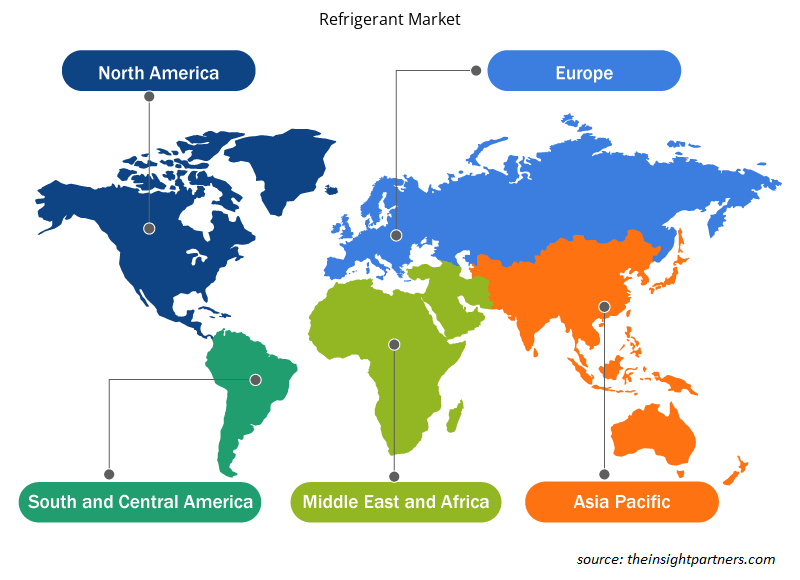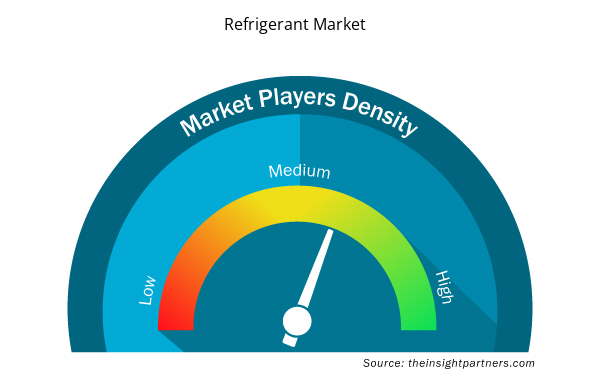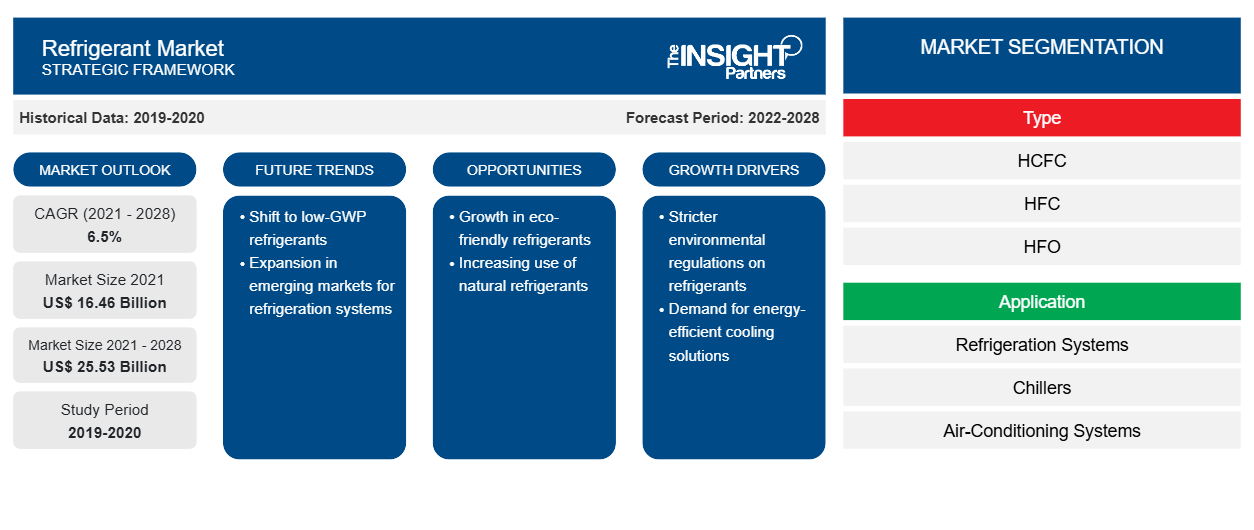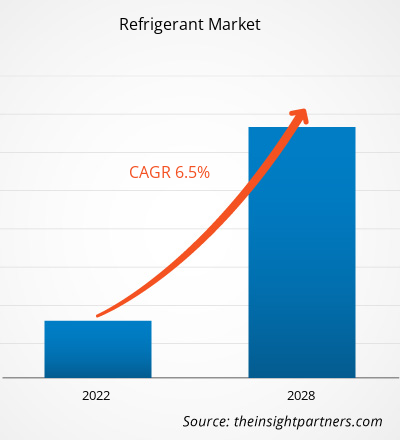[Rapporto di ricerca] Il mercato dei refrigeranti è stato valutato a 16.458,3 milioni di dollari nel 2021 e si prevede che raggiungerà i 25.534,6 milioni di dollari entro il 2028; si prevede che crescerà a un CAGR del 6,5% dal 2021 al 2028.
Il refrigerante è un tipo di fluido utilizzato nel ciclo termodinamico dell'aria condizionata. Il refrigerante subisce una transizione continua di fase da liquido a gas e poi da gas a liquido nel processo di refrigerazione. I refrigeranti sono ampiamente utilizzati come refrigeranti nei sistemi di refrigerazione, nei refrigeratori e nell'aria condizionata per assorbire il calore dall'ambiente circostante e pomparlo all'esterno.
Nel 2020, l'Asia Pacifica ha detenuto la quota di fatturato più grande del mercato globale dei refrigeranti . L'elevata domanda di sistemi di raffreddamento da parte di settori commerciali e industriali come l'elaborazione chimica, alimenti e bevande e assistenza sanitaria sta principalmente guidando il mercato nell'Asia Pacifica. Inoltre, la regione è composta da paesi come Giappone, Corea del Sud, India e Cina, che sono i principali produttori di sistemi di refrigerazione e aria condizionata. I refrigeranti HFC sono preferiti nei refrigeratori industriali per la loro perfetta stabilità termica, tossicità minima, non corrosività e non combustibilità. La crescente industrializzazione e urbanizzazione sono anche il fattore principale per la crescente domanda di refrigeranti nella regione.
Personalizza questo report in base alle tue esigenze
Riceverai la personalizzazione gratuita di qualsiasi report, comprese parti di questo report, o analisi a livello nazionale, pacchetto dati Excel, oltre a usufruire di grandi offerte e sconti per start-up e università
- Scopri le principali tendenze di mercato in questo rapporto.Questo campione GRATUITO includerà analisi di dati che spaziano dalle tendenze di mercato alle stime e alle previsioni.
Impatto della pandemia di COVID-19 sul mercato dei refrigeranti
La pandemia di COVID-19 ha colpito economie e industrie in vari paesi a causa di lockdown, divieti di viaggio e chiusure aziendali. Nel 2020, vari settori hanno dovuto rallentare le loro operazioni a causa di interruzioni nelle catene del valore causate dalla chiusura dei confini nazionali e internazionali, che hanno portato a una bassa domanda di refrigeranti da parte di vari settori. La pandemia di COVID-19 ha causato volatilità nei prezzi delle materie prime necessarie per produrre refrigeranti. Il consumo mondiale di refrigeranti è diminuito a causa della bassa domanda da parte di vari settori come l'edilizia e la produzione. La ridotta domanda da parte di vari settori dovuta alla pandemia di COVID-19 ha avuto un impatto negativo sulla crescita del mercato dei refrigeranti. Tuttavia, si prevede che la domanda di refrigeranti aumenterà a livello globale man mano che varie economie riprenderanno le loro operazioni.
Approfondimenti di mercato
Aumento della domanda di sistemi di refrigerazione
La refrigerazione è il processo essenziale nell'industria e negli elettrodomestici per raffreddare e mantenere la temperatura ambiente. Il sistema di refrigerazione è costituito da quattro componenti principali: compressore, condensatore, dispositivo di espansione ed evaporatore. I refrigeranti sono combinati con compressore ed evaporatore per assorbire calore dall'ambiente. La crescente domanda di sistemi di refrigerazione su larga scala nei settori industriale e commerciale sta alimentando la crescita del mercato. Molte industrie di produzione chimica utilizzano sistemi di refrigerazione su larga scala per la lavorazione chimica. Ciò ha portato a un aumento del consumo di refrigeranti a un tasso più elevato per le applicazioni industriali. Ad esempio, il refrigerante HFC è stato utilizzato durante il progetto Aramco in Arabia Saudita. Il boom dell'industrializzazione ha portato a un aumento della domanda di vari tipi di refrigeranti nel settore della refrigerazione e dell'aria condizionata (RAC).
I sistemi di refrigerazione sono utilizzati nella grande catena del freddo per lo stoccaggio e la distribuzione di merci con l'ausilio di trasporti refrigerati come camion frigoriferi, rotaie, auto e container. Il progresso nel settore della catena di fornitura con l'introduzione di sistemi di refrigerazione per il mantenimento della qualità dei prodotti durante il trasporto ha creato opportunità redditizie per il mercato dei refrigeranti.
Tipo Informazioni
In base al tipo, il mercato globale dei refrigeranti è stato segmentato in HCFC, HFC, HFO, isobutano, propano, ammoniaca, anidride carbonica e altri. Il segmento HFC ha detenuto la quota di mercato più grande nel mercato globale nel 2020. Gli HFC sono utilizzati principalmente nella refrigerazione, nell'aria condizionata, nelle schiume isolanti e nei propellenti per aerosol , con usi minori come solventi e protezione antincendio. I refrigeranti HFC sono utilizzati anche nei sistemi di aria condizionata dei veicoli. Pertanto, l'ambito di applicazione degli HFC è ritenuto responsabile del suo predominio nel mercato dei refrigeranti.
The Chemours Company; Arkema; Honeywell International Inc.; Linde plc; Air Liquide; Dongyue Group; SINOCHEM GROUP CO., LTD.; DAIKIN INDUSTRIES, Ltd.; AGC Inc.; e Airgas, Inc. sono tra i principali attori che operano nel mercato globale dei refrigeranti. Gli attori che operano nel mercato globale si concentrano costantemente su strategie quali investimenti in attività di ricerca e sviluppo e lanci di nuovi prodotti.
Segnala i riflettori
- Tendenze industriali progressive nel mercato dei refrigeranti per aiutare gli operatori a sviluppare strategie efficaci a lungo termine
- Strategie di crescita aziendale adottate dai mercati sviluppati e in via di sviluppo
- Analisi quantitativa del mercato dei refrigeranti dal 2019 al 2028
- Stima della domanda globale di refrigeranti
- Analisi delle cinque forze di Porter per illustrare l'efficacia degli acquirenti e dei fornitori che operano nel settore
- Sviluppi recenti per comprendere lo scenario competitivo del mercato
- Tendenze e prospettive del mercato, nonché fattori che guidano e frenano la crescita del mercato dei refrigeranti
- Assistenza nel processo decisionale evidenziando le strategie di mercato che sostengono l'interesse commerciale, portando alla crescita del mercato
- La dimensione del mercato dei refrigeranti in vari nodi
- Panoramica dettagliata e segmentazione del mercato, nonché dinamiche del settore dei refrigeranti
- Dimensioni del mercato dei refrigeranti in diverse regioni con promettenti opportunità di crescita
Approfondimenti regionali sul mercato dei refrigeranti
Le tendenze regionali e i fattori che influenzano il mercato dei refrigeranti durante il periodo di previsione sono stati ampiamente spiegati dagli analisti di Insight Partners. Questa sezione discute anche i segmenti e la geografia del mercato dei refrigeranti in Nord America, Europa, Asia Pacifico, Medio Oriente e Africa e America meridionale e centrale.

- Ottieni i dati specifici regionali per il mercato dei refrigeranti
Ambito del rapporto sul mercato dei refrigeranti
| Attributo del report | Dettagli |
|---|---|
| Dimensioni del mercato nel 2021 | 16,46 miliardi di dollari USA |
| Dimensioni del mercato entro il 2028 | 25,53 miliardi di dollari USA |
| CAGR globale (2021 - 2028) | 6,5% |
| Dati storici | 2019-2020 |
| Periodo di previsione | 2022-2028 |
| Segmenti coperti | Per tipo
|
| Regioni e Paesi coperti | America del Nord
|
| Leader di mercato e profili aziendali chiave |
|
Densità degli operatori del mercato dei refrigeranti: comprendere il suo impatto sulle dinamiche aziendali
Il mercato dei refrigeranti sta crescendo rapidamente, spinto dalla crescente domanda degli utenti finali dovuta a fattori quali l'evoluzione delle preferenze dei consumatori, i progressi tecnologici e una maggiore consapevolezza dei vantaggi del prodotto. Con l'aumento della domanda, le aziende stanno ampliando le loro offerte, innovando per soddisfare le esigenze dei consumatori e capitalizzando sulle tendenze emergenti, il che alimenta ulteriormente la crescita del mercato.
La densità degli operatori di mercato si riferisce alla distribuzione di aziende o società che operano in un particolare mercato o settore. Indica quanti concorrenti (operatori di mercato) sono presenti in un dato spazio di mercato in relazione alle sue dimensioni o al valore di mercato totale.
Le principali aziende che operano nel mercato dei refrigeranti sono:
- La società Chemours
- Arkema
- Honeywell International Inc.
- Linde SpA
- Aria Liquida
Disclaimer : le aziende elencate sopra non sono classificate secondo un ordine particolare.

- Ottieni una panoramica dei principali attori del mercato dei refrigeranti
Mercato globale dei refrigeranti
Tipo
- Idrocarburi clorurati
- HFC
- Olio ad alto volume
- Isobutano
- Propano
- Ammoniaca
- Anidride carbonica
- Altri
Applicazione
- Sistemi di refrigerazione
- Refrigeratori
- Sistemi di aria condizionata
- MAC
- Altri
Profili aziendali
- La società Chemours
- Arkema
- Honeywell International Inc.
- Linde SpA
- Aria Liquida
- Gruppo Dongyue
- SINOCHEM GROUP CO., LTD.
- DAIKIN INDUSTRIES, Ltd.
- Società anonima AGC Inc.
- Azienda Airgas, Inc.
- Analisi storica (2 anni), anno base, previsione (7 anni) con CAGR
- Analisi PEST e SWOT
- Valore/volume delle dimensioni del mercato - Globale, regionale, nazionale
- Industria e panorama competitivo
- Set di dati Excel


- Visualization and 3D Rendering Software Market
- Resistance Bands Market
- Europe Surety Market
- Europe Tortilla Market
- Ketogenic Diet Market
- Fixed-Base Operator Market
- Retinal Imaging Devices Market
- Integrated Platform Management System Market
- Medical and Research Grade Collagen Market
- Thermal Energy Storage Market

Report Coverage
Revenue forecast, Company Analysis, Industry landscape, Growth factors, and Trends

Segment Covered
This text is related
to segments covered.

Regional Scope
North America, Europe, Asia Pacific, Middle East & Africa, South & Central America

Country Scope
This text is related
to country scope.
Domande frequenti
The major players operating in the global refrigerant market are The Chemours Company; Arkema; Honeywell International Inc.; Linde plc; Air Liquide; Dongyue Group; SINOCHEM GROUP CO., LTD.; DAIKIN INDUSTRIES, Ltd.; AGC Inc.; Airgas, Inc.
Based on type, the HFC segment accounted for the largest revenue share. HFCs are widely utilized refrigerants in most cooling units across the world.
Growing consumption of eco-friendly refrigerants offers a strong growth opportunity for the refrigerant market in the coming years.
Asia Pacific accounted for the largest share of the global refrigerant market.
The rise in demand for refrigeration systems and an increase in per-capita income in the developing economies are some of the key driving factors for the refrigerant market.
Based on application, the air conditioning system is the fastest-growing segment owing to the increasing use of air conditioning systems in commercial and residential places as they provide cooling or maintain a specific room temperature.
Trends and growth analysis reports related to Chemicals and Materials : READ MORE..
The List of Companies - Refrigerants Market
- The Chemours Company
- Arkema
- Honeywell International Inc.
- Linde plc
- Air Liquide
- Dongyue Group
- SINOCHEM GROUP CO., LTD.
- DAIKIN INDUSTRIES, Ltd.
- AGC Inc.
- Airgas, Inc.
The Insight Partners performs research in 4 major stages: Data Collection & Secondary Research, Primary Research, Data Analysis and Data Triangulation & Final Review.
- Data Collection and Secondary Research:
As a market research and consulting firm operating from a decade, we have published and advised several client across the globe. First step for any study will start with an assessment of currently available data and insights from existing reports. Further, historical and current market information is collected from Investor Presentations, Annual Reports, SEC Filings, etc., and other information related to company’s performance and market positioning are gathered from Paid Databases (Factiva, Hoovers, and Reuters) and various other publications available in public domain.
Several associations trade associates, technical forums, institutes, societies and organization are accessed to gain technical as well as market related insights through their publications such as research papers, blogs and press releases related to the studies are referred to get cues about the market. Further, white papers, journals, magazines, and other news articles published in last 3 years are scrutinized and analyzed to understand the current market trends.
- Primary Research:
The primarily interview analysis comprise of data obtained from industry participants interview and answers to survey questions gathered by in-house primary team.
For primary research, interviews are conducted with industry experts/CEOs/Marketing Managers/VPs/Subject Matter Experts from both demand and supply side to get a 360-degree view of the market. The primary team conducts several interviews based on the complexity of the markets to understand the various market trends and dynamics which makes research more credible and precise.
A typical research interview fulfils the following functions:
- Provides first-hand information on the market size, market trends, growth trends, competitive landscape, and outlook
- Validates and strengthens in-house secondary research findings
- Develops the analysis team’s expertise and market understanding
Primary research involves email interactions and telephone interviews for each market, category, segment, and sub-segment across geographies. The participants who typically take part in such a process include, but are not limited to:
- Industry participants: VPs, business development managers, market intelligence managers and national sales managers
- Outside experts: Valuation experts, research analysts and key opinion leaders specializing in the electronics and semiconductor industry.
Below is the breakup of our primary respondents by company, designation, and region:

Once we receive the confirmation from primary research sources or primary respondents, we finalize the base year market estimation and forecast the data as per the macroeconomic and microeconomic factors assessed during data collection.
- Data Analysis:
Once data is validated through both secondary as well as primary respondents, we finalize the market estimations by hypothesis formulation and factor analysis at regional and country level.
- Macro-Economic Factor Analysis:
We analyse macroeconomic indicators such the gross domestic product (GDP), increase in the demand for goods and services across industries, technological advancement, regional economic growth, governmental policies, the influence of COVID-19, PEST analysis, and other aspects. This analysis aids in setting benchmarks for various nations/regions and approximating market splits. Additionally, the general trend of the aforementioned components aid in determining the market's development possibilities.
- Country Level Data:
Various factors that are especially aligned to the country are taken into account to determine the market size for a certain area and country, including the presence of vendors, such as headquarters and offices, the country's GDP, demand patterns, and industry growth. To comprehend the market dynamics for the nation, a number of growth variables, inhibitors, application areas, and current market trends are researched. The aforementioned elements aid in determining the country's overall market's growth potential.
- Company Profile:
The “Table of Contents” is formulated by listing and analyzing more than 25 - 30 companies operating in the market ecosystem across geographies. However, we profile only 10 companies as a standard practice in our syndicate reports. These 10 companies comprise leading, emerging, and regional players. Nonetheless, our analysis is not restricted to the 10 listed companies, we also analyze other companies present in the market to develop a holistic view and understand the prevailing trends. The “Company Profiles” section in the report covers key facts, business description, products & services, financial information, SWOT analysis, and key developments. The financial information presented is extracted from the annual reports and official documents of the publicly listed companies. Upon collecting the information for the sections of respective companies, we verify them via various primary sources and then compile the data in respective company profiles. The company level information helps us in deriving the base number as well as in forecasting the market size.
- Developing Base Number:
Aggregation of sales statistics (2020-2022) and macro-economic factor, and other secondary and primary research insights are utilized to arrive at base number and related market shares for 2022. The data gaps are identified in this step and relevant market data is analyzed, collected from paid primary interviews or databases. On finalizing the base year market size, forecasts are developed on the basis of macro-economic, industry and market growth factors and company level analysis.
- Data Triangulation and Final Review:
The market findings and base year market size calculations are validated from supply as well as demand side. Demand side validations are based on macro-economic factor analysis and benchmarks for respective regions and countries. In case of supply side validations, revenues of major companies are estimated (in case not available) based on industry benchmark, approximate number of employees, product portfolio, and primary interviews revenues are gathered. Further revenue from target product/service segment is assessed to avoid overshooting of market statistics. In case of heavy deviations between supply and demand side values, all thes steps are repeated to achieve synchronization.
We follow an iterative model, wherein we share our research findings with Subject Matter Experts (SME’s) and Key Opinion Leaders (KOLs) until consensus view of the market is not formulated – this model negates any drastic deviation in the opinions of experts. Only validated and universally acceptable research findings are quoted in our reports.
We have important check points that we use to validate our research findings – which we call – data triangulation, where we validate the information, we generate from secondary sources with primary interviews and then we re-validate with our internal data bases and Subject matter experts. This comprehensive model enables us to deliver high quality, reliable data in shortest possible time.


 Ottieni un campione gratuito per questo repot
Ottieni un campione gratuito per questo repot